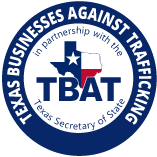Best Practices In Combatting Human Trafficking
Below are examples of Best Practices that may be helpful for your business, including best practices that are reported by our current partners.
Business Policies
- Adopt a zero tolerance policy (See definition at 1 Texas Administrative Code Chapter 90) that addresses: entertainment and business expenses, work time and properties policy, reporting procedures, and disciplinary procedures. (See examples of zero tolerance policies for examples of policies.)
- Provide required training for employees about the zero tolerance policy and: 1) provide information and resources for assisting victims of human trafficking; and 2) establish points of contact for employees to report violations without retaliation. Ensure that online training is continuously available to employees.
- Request vendors, suppliers, and contractors sign a Code of Conduct for ethical business practices that prohibit human trafficking.
- Audit supply lines to ensure they are free from human trafficking.
Public Advocacy, Leadership, and Financial Support
- With purchase of products, include a flyer that discusses human trafficking and how to report concerns.
- Donate a percentage of profit from purchase of a particular product or service to an anti-trafficking non-profit; Allow customers to select the non-profit they want their purchase to support.
- Invite non-profits supported by the business to speak to employees about the organization’s fight against human trafficking.
- Partner with government officials and legislatively advocate to prevent and end human trafficking and provide support services for victims.
- Encourage employees, vendors, suppliers and contractors to participate in public awareness events such as Shine a Light on Slavery Day (i.e. Draw a red X on your hand and tell the world about the #ENDITMOVEMENT).
- Encourage business-wide, ongoing volunteer work and donations related to anti-trafficking.
- Provide employees with a list of local organizations needing volunteers and allow employees to volunteer during their normal working hours.
- Host internal events designed to encourage giving to anti-trafficking organizations (e.g. contests, raffles).
Support education and training for Human Trafficking Survivors
- Support organizations that help survivors of human trafficking and at-risk populations obtain education and training for long-term employment.
- Sponsor scholarships for survivors of human trafficking to help them receive the education and training needed for long-term employment.

